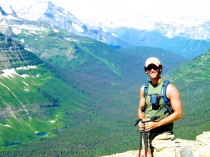December 30, 2013
Integrating Narrative Therapy into the Wilderness Process

I wanted to use this space to share some of my recent excitement as I continue to evolve as a therapist. I am deeply impacted by my work with clients and that impact drives me to seek further understanding and to continue to expand my toolbox. I wanted to take this space to talk about my excitement around Narrative Therapy. Narrative therapy asserts that identities of human beings are shaped by the narratives they story about themselves through language. Narrative therapy is a strengths-based approach and believes that “problem is the problem” and problems do not reside inside or are a part of people. Narrative therapists collaborate with their clients to deconstruct and make meaning of their life stories and develop a narrative and an identity, they most prefer.
Counseling can be a murky process without a clear roadmap. As a therapist, my ultimate goal is to help clients reduce their suffering and find more meaning, joy, and purpose in their life. I work towards that goal by working hard to understand the story and goals of my clients and building a strong relationship. I also utilize what emerges in our process as we explore content as an opportunity to increase self-awareness and potentially shift patterns.
I integrate various approaches in my work with clients based on the best approach for each client and their presenting problem. However, I have recently become more intrigued by what Narrative Therapy can offer. I have had that feeling of when a shoe fits just right. It possesses a heavy focus on experiential, here-and-now moments that I find so powerful. I believe that people ascribe meaning to the events, relationships, and reality of their lives through the stories they tell themselves and others. I work with so many young men who have incredible gifts including high intelligence but are limited because of the stories they have internalized about their ability to reach the ‘potential’ they have heard so much about. My goal is to help clients open up different possibilities and directions based on helping them refocus and redefine their narrative. I cannot directly change the reality of a clients’ problem but there is a potential for potent and rich work if we focus on how the client internalizes and views what is occurring. Wilderness is a fertile environment for clients to get in touch with their capacity to create a new, more desirable future. Helping a client change and externalize their problems and then address their relationship to their problem are much more manageable tasks. I find joy in helping clients (such as young men) recognize the power of letting go of cultural myths they have internalized as fact (such as the idea that lack of emotional expression equates to strength).
Operationally, I use an experiential, process-oriented approach in order to help my clients increase self-awareness, develop coping skills, and unleash their innate capacity to adapt and thrive. I often use the quote “society is information rich but experience poor” to explain my focus on process and the experiencing of emotion over content and knowledge. Experience and the processing of the experience is an active practice that gives us an instrument to learn about and potentially alter the client’s narrative. Attending to the relational process between myself and the client provides an interpersonal process can be an invaluable mechanism of change.
As someone working from a Narrative Therapy perspective I work hard to hold up a mirror for clients with the belief that, when freed from their problem-saturated narratives, clients will be able to connect to their innate goodness and potential. I recognize that I bring my own story into the counseling relationship and work hard to address my own process in a healthy way that serves the relationship. I hope to avoid positioning myself as an expert in the life of my client, but instead to offer an opportunity to reframe and shift their relationship with the problems they have identified.
The process of leaning into discomfort and reflecting on one’s internal workings can be daunting. That is why I am so glad to have a team of staff, the wilderness, and a peer group that creates such a safe, reflective environment to help support and drive the process forward. As I have read more and more about Narrative Therapy, it is so clear how wilderness provides a fertile context for clients and their families to break free of crippling beliefs and acquire new possibility laden narratives based on actual experiences they have had in the wilderness.
For more information on Narrative Therapy check out:
http://www.narrativetherapycentre.com/narrative.html or the book “Narrative Means to Therapeutic Ends” by Michael White.
